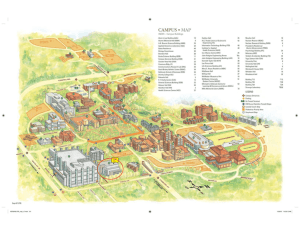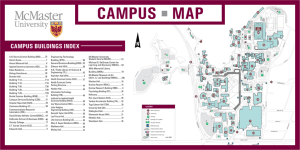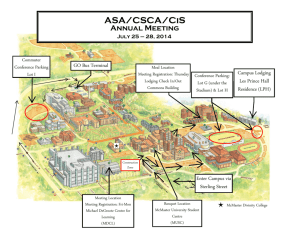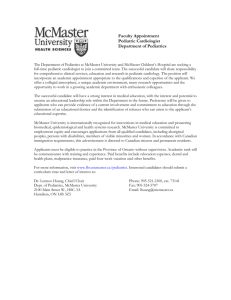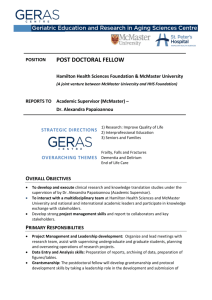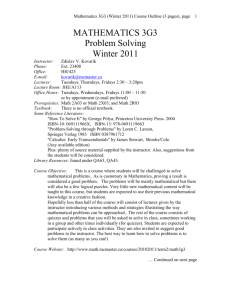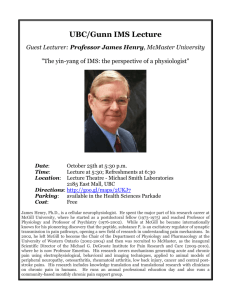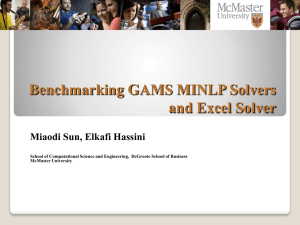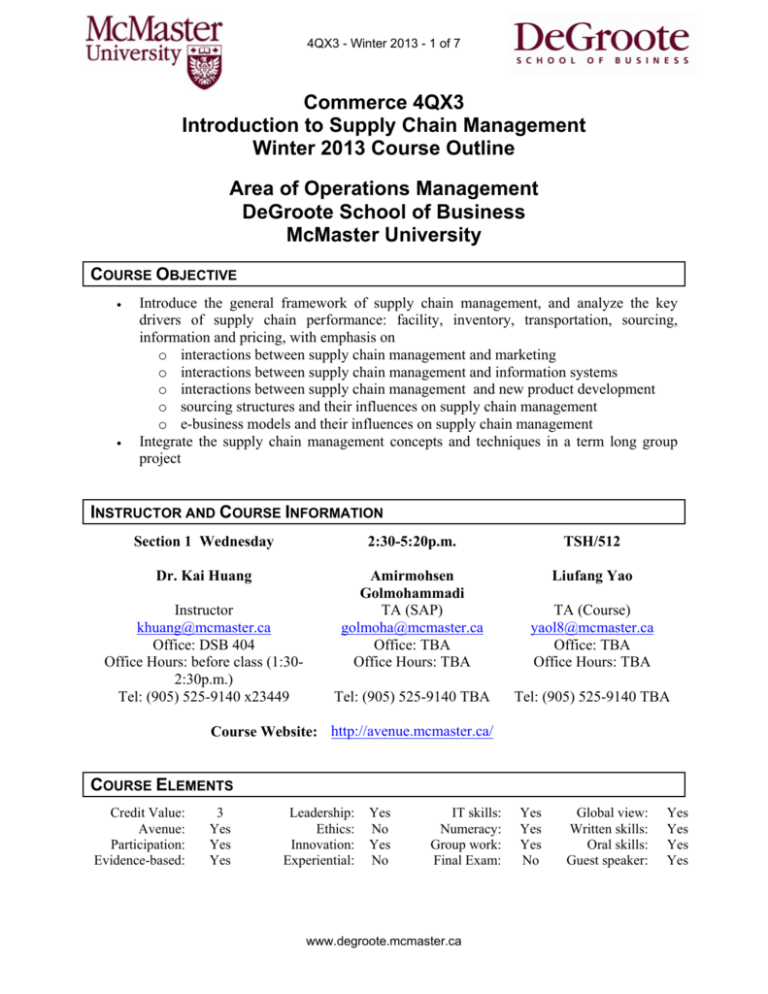
4QX3 - Winter 2013 - 1 of 7
Commerce 4QX3
Introduction to Supply Chain Management
Winter 2013 Course Outline
Area of Operations Management
DeGroote School of Business
McMaster University
COURSE OBJECTIVE
Introduce the general framework of supply chain management, and analyze the key
drivers of supply chain performance: facility, inventory, transportation, sourcing,
information and pricing, with emphasis on
o interactions between supply chain management and marketing
o interactions between supply chain management and information systems
o interactions between supply chain management and new product development
o sourcing structures and their influences on supply chain management
o e-business models and their influences on supply chain management
Integrate the supply chain management concepts and techniques in a term long group
project
INSTRUCTOR AND COURSE INFORMATION
Section 1 Wednesday
2:30-5:20p.m.
TSH/512
Dr. Kai Huang
Amirmohsen
Golmohammadi
TA (SAP)
golmoha@mcmaster.ca
Office: TBA
Office Hours: TBA
Liufang Yao
TA (Course)
yaol8@mcmaster.ca
Office: TBA
Office Hours: TBA
Tel: (905) 525-9140 TBA
Tel: (905) 525-9140 TBA
Instructor
khuang@mcmaster.ca
Office: DSB 404
Office Hours: before class (1:302:30p.m.)
Tel: (905) 525-9140 x23449
Course Website: http://avenue.mcmaster.ca/
COURSE ELEMENTS
Credit Value:
Avenue:
Participation:
Evidence-based:
3
Yes
Yes
Yes
Leadership:
Ethics:
Innovation:
Experiential:
Yes
No
Yes
No
IT skills:
Numeracy:
Group work:
Final Exam:
www.degroote.mcmaster.ca
Yes
Yes
Yes
No
Global view:
Written skills:
Oral skills:
Guest speaker:
Yes
Yes
Yes
Yes
4QX3 - Winter 2013 - 2 of 7
COURSE DESCRIPTION
Supply chain, the network of materials, information and money, has become a key dimension in
business competition. Look around us, Apple, Wal-mart, IKEA, FedEx are the examples of
extremely successful supply chain management, which helps them prevail in their own
industries. In this course, we will present the basic concepts and techniques in supply chain
management, and integrate them in a large-scale simulation called LINKS SIMULATION. In
this term-long project, we will learn how to manage a supply chain by ourselves. Teams will
compete with each other to succeed in a virtual business world. Between simulation rounds, we
will have lectures to discuss the key drivers in supply chain management, and learn the success
and failure stories of supply chain management.
LEARNING OUTCOMES
Upon completion of this course, students will be able to complete the following tasks:
Understand the basic concepts and key drivers in supply chain management
Understand the relationships between supply chain management and marketing, information,
new product development, e-business and sourcing
Synthesize the knowledge and techniques in the term long group project
REQUIRED COURSE MATERIALS AND READINGS
Supply Chain Management: Strategy, Planning, and Operation. Sunil Chopra, Peter Meindl,
Pearson Prentice Hall, 2007
The text book is not mandatory.
EVALUATION
Components and Weights
Components
Weights
Quizzes
20%
Presentations
20%
SAP assignments
10%
Course participation
10%
Group project report
40%
Total
100%
NOTE: The use of a McMaster standard calculator (Casio FX-991) is allowed during
quizzes/examinations in this course. See McMaster calculator policy at the following URL:
www.degroote.mcmaster.ca
4QX3 - Winter 2013 - 3 of 7
http://www.mcmaster.ca/senate/academic/calculat.htm.
Conversion
At the end of the course your overall percentage grade will be converted to your letter grade in
accordance with the following conversion scheme.
LETTER GRADE
A+
A
AB+
B
B-
PERCENT
92 - 100
87 -91
82 - 86
77 - 81
73 - 76
70 - 72
LETTER GRADE
C+
C
CD+
D
DF
PERCENT
67 - 69
63 - 66
60 - 62
57 - 59
53 - 56
50 - 52
00 – 49
Note: if the first decimal place is greater than or equal to 5 then the score will be rounded up,
otherwise it will be rounded down.
Communication and Feedback
Students that are uncomfortable in directly approaching an instructor regarding a course concern
may choose to send a confidential and anonymous email to the respective Area Chair at:
http://www.degroote.mcmaster.ca/curr/emailchairs.aspx
Students who wish to correspond with instructors directly via email must send messages that
originate from their official McMaster University email account.
This protects the
confidentiality and sensitivity of information as well as confirms the identity of the student.
Instructors should conduct an informal course review with students by Week 4 to allow time for
modifications in curriculum delivery.
Quizzes
A quiz will take 30~60 minutes and is in class. Each quiz is worth 10 percent of the score. The
content of a quiz includes lecture slides/notes and reading materials. The form of a quiz includes
multiple choices, true/false choices, completion, and short answers. There are three quizzes in
total. Two best quizzes will be counted and the quiz with the lowest score will be ignored.
Presentations
Each student will make two presentations in the course. One is on a topic assigned by the
instructor, which will take about 20 minutes (by an individual), and the other is on the group
project, which will take about 40 minutes (by a group). When the presentation is given by a
group of students, the work load must be evenly distributed among students in the group. The
evaluation may include three parts: contents of the slides, structure of the slides and the
presentation.
www.degroote.mcmaster.ca
4QX3 - Winter 2013 - 4 of 7
Course Participation
Students will be evaluated according to their course participation, which includes the attendance
of lectures, class discussions and office hours for the group project.
SAP Assignments
This course is part of the SAP certificate program. The students will finish SAP assignments
under the guidance of Mr. Amir Golmohammadi (TA).
Group Project Report
Each group of students must complete a report on the project. In the report, the students must
analyze the project in details (including calculation), answer questions arising from the project,
or given by the instructor, and propose and analyze strategies to improve the supply chain
management. The workload should be distributed evenly among all the students in the group.
ACADEMIC DISHONESTY
It is the student’s responsibility to understand what constitutes academic dishonesty. Please refer
to the University Senate Academic Integrity Policy at the following URL:
http://www.mcmaster.ca/policy/Students-AcademicStudies/AcademicIntegrity.pdf
This policy describes the responsibilities, procedures, and guidelines for students and faculty
should a case of academic dishonesty arise. Academic dishonesty is defined as to knowingly act
or fail to act in a way that results or could result in unearned academic credit or advantage.
Please refer to the policy for a list of examples. The policy also provides faculty with procedures
to follow in cases of academic dishonesty as well as general guidelines for penalties. For further
information related to the policy, please refer to the Office of Academic Integrity at:
http://www.mcmaster.ca/academicintegrity
REQUESTING RELIEF FOR MISSED ACADEMIC WORK
1.
Students may request relief from a regularly scheduled midterm, test, assignment or other
course component in the following two ways:
a)
b)
for absences from classes lasting up to five (5) days; or
for absences from classes lasting more than five (5) days.
a)
For absences from classes lasting up to five (5) days
www.degroote.mcmaster.ca
4QX3 - Winter 2013 - 5 of 7
Students must use the MSAF (McMaster Student Absence Form). This is an on-line, selfreporting tool, for which submission of medical or other types of supporting documentation is
normally not required. Students may use this tool to submit a maximum of one (1) request for
relief of missed academic work per term as long as the weighting of the component is worth 29%
of the final grade or less. Students must follow up with their course instructors regarding the
nature of the relief within two days of submitting the form. Failure to do so may negate the
opportunity for relief. It is the prerogative of the instructor of the course to determine the
appropriate relief for missed term work in his/her course.
If the value of the component is worth 30% or more, students must report to the APO to discuss
their situation and will be required to provide appropriate supporting documentation.
b)
For absences from classes lasting more than five (5) days
Students cannot use the MSAF. They MUST report to the APO to discuss their situation and
will be required to provide appropriate supporting documentation.
Students who wish to submit more than one request for relief of missed academic work per term
cannot use the MSAF. They must report to the APO and discuss their situation with an academic
advisor. They will be required to provide supporting documentation and meet with the Director.
The MSAF cannot be used during any final examination period.
Students unable to write a mid-term at the posted exam time due to the following reasons:
religious; work-related (for part-time students only); representing university at an academic or
varsity athletic event; conflicts between two overlapping scheduled mid-term exams; or other
extenuating circumstances, have the option of applying for special exam arrangements. Please
see the DeGroote Missed Course Work Policy for a list of conflicts that qualify for academic
accommodation
(http://www.degroote.mcmaster.ca/ug/documents/MissedCourseWorkFormOct2012.pdf).
Such requests must be made to the Academic Programs Office at least ten (10) working days
before the scheduled exam along with acceptable documentation. Instructors cannot themselves
allow students to unofficially write make-up exams/tests. Adjudication of the request must be
handled by the Academic Programs Office.
If a mid-term exam is missed without a valid reason, students will receive a grade of zero (0) for
that component.
STUDENT ACCESSIBILITY SERVICES
Student Accessibility Services (SAS) offers various support services for students with
disabilities. Students are required to inform SAS of accommodation needs for course work at the
outset of term. Students must forward a copy of such SAS accommodation to the instructor
normally, within the first three (3) weeks of classes by setting up an appointment with the
www.degroote.mcmaster.ca
4QX3 - Winter 2013 - 6 of 7
instructor. If a student with a disability chooses NOT to take advantage of an SAS
accommodation and chooses to sit for a regular exam, a petition for relief may not be filed after
the examination is complete. The SAS website is:
http://sas.mcmaster.ca
POTENTIAL MODIFICATIONS TO THE COURSE
The instructor and university reserve the right to modify elements of the course during the term.
The university may change the dates and deadlines for any or all courses in extreme
circumstances. If either type of modification becomes necessary, reasonable notice and
communication with the students will be given with explanation and the opportunity to comment
on changes. It is the responsibility of the student to check their McMaster email and course
websites weekly during the term and to note any changes.
www.degroote.mcmaster.ca
4QX3 - Winter 2013 - 7 of 7
COURSE SCHEDULE
Commerce 4QX3
Introduction to Supply Chain Management
Winter 2013 Course Schedule
WEEK
TOPIC
Jan. 9 C01
L1 Introduction to supply
chain management
Jan. 16 C01
L2 Strategic fit
Jan. 23 C01
L3 Supply chain drivers
Jan. 30 C01
L4 Introduction to the LINKS
simulation
Feb. 6 CO1
Feb. 13 C01
Feb. 20 C01
Feb. 27 C01
Mar. 6 C01
Mar. 13 C01
Mar. 20 C01
Mar. 27 C01
ASSIGNMENT
L5 Supply chain network
design
DEADLINE
Quiz 1
L6 Distribution strategies
Cancelled (midterm week)
L7 Information technology
and supply chain
Management
L8 Outsourcing
L9 Procurement
Quiz 2
L10 Supply contracts
L11 Coordinated product and
supply chain design
Apr.3 C01
Presentations of group
projects
Apr. 10 C01
Guest speaker
Quiz 3, Group project
report
www.degroote.mcmaster.ca

